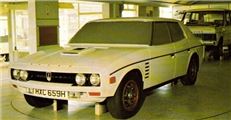Anger over British Leyland decision to cancel P8
13 March 1971
By Julian Mounter
Our Motoring Correspondent
There is considerable disappointnent and some anger at Solihull over the decision of British Leyland to cancel the P8 car, Rover's intended successor for the 3-5 litre model. Officially, the company is restricting comment to a four line statement which only hints at rationalization; but it is clear that not only is the cancellation a bold stroke to prevent any duplication of, or competition with the Jaguar XJ6, but it may be the first move in a generally tougher rationalization programme.
What has caused most of the discontent is that trials and testings have suggested the car would have been excellent, some engineers believe it would have fetched the same sort of acclamation given to the XJ6. The point is being made, too, that with supply of the Jaguar completely outstripped by demand and some would-be Jaguar customers buying foreign cars competition between the two models would have been minimal.
The 3-5 litre, although still an excellent motor car, is certainly going to be dated in two or three years. and with the loss of both the Austin 3 litre and the Jaguar 420G, British Leyland will, it seems, be expecting the XJ6 to satisfy too wide a range of tastes. One executive told me he thought the decision meant a general long-term policy of slotting Rover in between Triumph and Jaguar.
"But where does that leave our 2000, and what about the clash between the bottom of the range models: with the introduction of the ADO 28 (Morris's new family car) surelv there is duplication there ", he said.
The P8 had reached an advanced stage of development, tooling plans had been made and orders for parts had gone out. It is repeatedly emphasized that the decision was not made because of financial considerations.
"It was a product decision ". say Rover.
Who pushed it through? One comment says that it was mainly Lord Stokes who tired of criticism that rationalization has not been fast enough in the corporation establishment - mainly engines - has shied at the danger of being blamed for anything that might look like near duplication. That is possibly uncharitable. Certainly rationalization has been swift in these areas; as much as the unions and distribution problems would have allowed.
Factories hit
Two other strikes which have been affecting British Leyland production in Birmingham were settled yesterday. About 180 workers in the paint shop at Longbridge who went on strike over the introduction of a new process last week and stopped production of the 1100 and 1300 models agreed to return to work. Day shift production workers who reported for work yesterday were sent home again at lunchtime because talks were still in progress, but production was resumed on last night's night shift.
Two British Leyland factories in Birmingham were affected by disputes yesterday. At the S.U. carburettor factory in Erdington, a management spokesman said car assembly would be affected if a strike by 20 labourers continued. At Longbridge 600 production workers were laid off because of a painters' dispute. At Erdington, the 20 labourers stopped work earlier in the week over a dispute involving introduction of temporary workers.
Later they were joined by 70 indirect workers. A spokesman for British Leyland said yesterday that out of the total labour force of 1,200, the number laid off because of the strike was 660. A company spokesman said that at Longbridge, the 600 lay-offs arose because 180 paint workers had decided to walk out in protest against a new body protection process which does not require so many workers. The 600 all work on production of 1100 and 1300 models in two sections of the factory.
The spokesman added that the workers affected by the new process were all being found other jobs at Longbridge.
More news from the archive
Compare classic car insurance quotes and buy online. A friendly service offering access to a range of policies and benefits.





